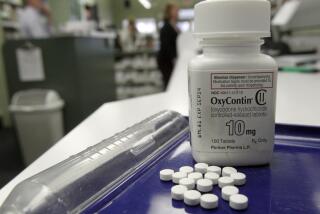Looking at Human Growth Hormone in a New Light
- Share via
As many as 75,000 adults who could benefit from treatment with human growth hormone are not receiving it because their physicians are not aware of its benefits or their insurance companies will not pay for the prescriptions, according to medical specialists.
At the same time, many people taking it to increase their athletic prowess or to slow aging are probably not getting any benefit and may be endangering their health, doctors representing the American Assn. of Clinical Endocrinologists said last week as the society issued new guidelines for use of the drug.
“We need to get this information out to both physicians and laymen so that people will think about it,” said Dr. Stanley Feld, a past president of the AACE and a professor at the University of Texas Southwestern Medical Center in Dallas.
Before 1985, human growth hormone, or hGH, could be obtained only from the pituitary glands of cadavers. The limited supply was used to treat children with hGH deficiencies who would otherwise never grow to normal height. There are about 10,000 such children in the United States at any time.
In 1985, however, pharmaceutical companies began making the hormone in bacteria using genetic engineering techniques to produce a safe, virtually unlimited--albeit expensive--supply. Unfortunately, said Dr. Hossein Gharib of the Mayo Clinic in Rochester, Minn., who chaired the AACE task force that drew up the new guidelines, the illegitimate and unproved uses of hGH have grown faster than the desirable ones.
As many as 75,000 adult Americans suffer hGH deficiencies, according to the association. About half that number have genetically determined deficiencies and received hGH while they were growing up. Such treatment has usually been halted when the children were thought to have reached their full growth potential.
The other half represents people with pituitary glands that have been damaged by cancer, radiation or trauma. Such people never received hGH treatment in the past, primarily because there was not enough hormone available. Moreover, “we never thought it was important,” Gharib said.
Among the symptoms of hGH deficiency are increased weight, decreased muscle mass and strength, impaired exercise capacity, reduced cardiac performance, reduced bone density, poor sleep and an impaired sense of well-being. Such people have a higher risk of heart disease and early death.
All people with a certified hGH deficiency should be treated with the hormone, according to the new guidelines. “But the statistics show that when an endocrinologist writes a prescription [for hGH], the insurance company will balk at paying for it 30% to 60% of the time,” Feld said.
“What we are promoting is that, if there is a proven deficiency and there is a valid medical reason to prescribe it, then the patient should be entitled to it,” he said.
Feld and Gharib cautioned that there is “no proven benefit” to athletic prowess resulting from hGH. In fact, if it is given in doses less than about 6 milligrams per day--the body’s own output--the pituitary simply reduces production by a similar amount.
Larger doses run the risk of producing acromegaly, which is associated with hypertension, arthritis, heart disease and, ironically, decreased muscle strength.
Similarly, they said, there is no proof that the hormone increases vitality or rejuvenates elderly people who do not have a deficiency.
The guidelines can be viewed at the association’s Web site, https://www.aace.com/clin/guides/ghg.html.





